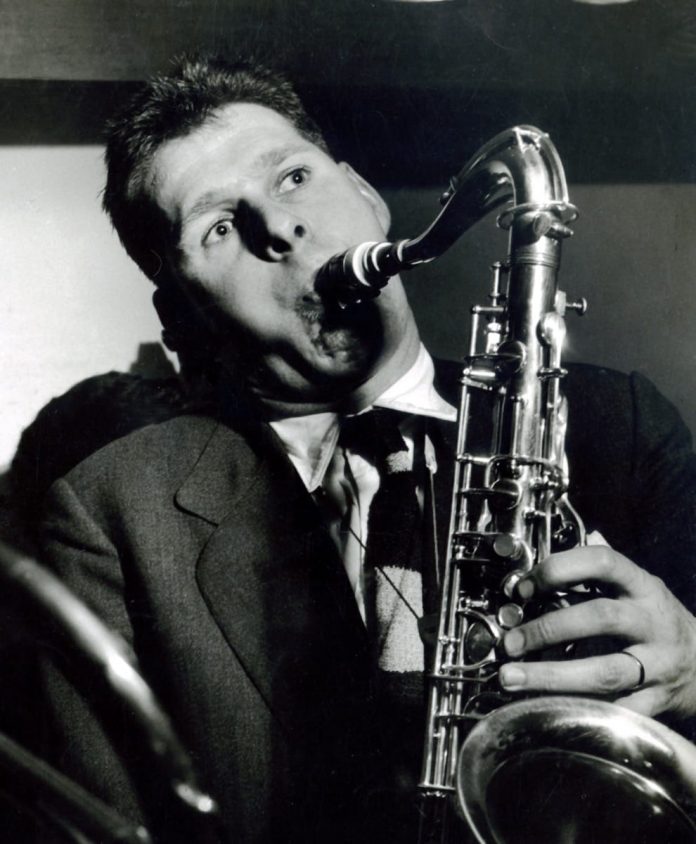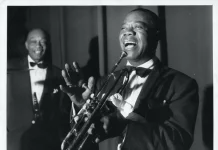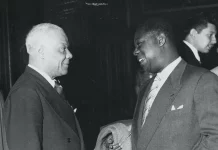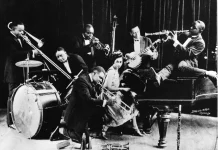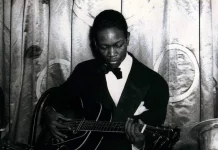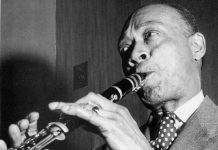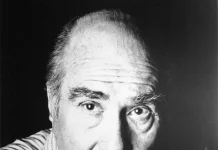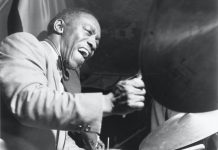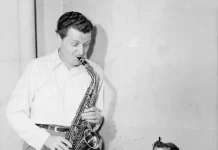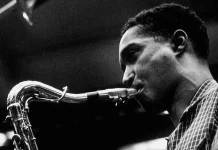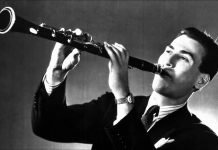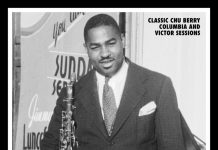The BBC Four programme on Ronnie Scott (still available for 11 months and reviewed here) was a mixed medley. The music clips were too brief, brash, abrasive and thus ultimately pointless. The amateur film clips of long-dead musicians were interesting, but they’d mostly been previously been included in a jazz film about Soho. And little was made of the fact that Ronnie was an outstandingly good tenor player. I asked him once, decades ago, who had been the main influence on him and he said that both he and Tubby, but particularly Ronnie, had been inspired by the work of Hank Mobley.
Decades ago? That was a time when the main thrust of British jazz was a cardboard sound. To find a British player who could compare with American counterparts was vanishingly rare
Decades ago? That was a time when the main thrust of British jazz was a cardboard sound. To find a British player who could compare with American counterparts was vanishingly rare. It was when the vanishingly rare played with American bands that they found this to be true – with a vengeance. Don Rendell told me about his time as a dep with the Kenton band. On that Kenton British tour, Spencer Sinatra was sent home to the States, allegedly for drug misdemeanours, but probably it was because of a disruptive affair he had with Ronnie’s girlfriend.
This was at the time when our big bands did indeed sound lifeless compared with the top American ones. There were many cynical structures and strictures about the British record industry. Did you know, for example, that the issue of popular American records in this country was delayed for six weeks by law to give the British musicians a chance to cream some money off with their versions? (This was a time when it was not an infrequent practice for local musicians to bring a new record back from the States and to copy and re-use every aspect of it for their own subsequent version).
And did you ever wonder why the B side of a record would usually be an inferior performance coupled to an outstanding A side? It was because in this system the B side would earn as much in royalties as the superior A side.
“It was terrifying when I first joined the Kenton band”, Don told me. “I’d just left Ted Heath, and Vic Lewis drove me down to Cardiff where I met them for the first time. I had a look at the book in the band room for half an hour before the concert. The music was absolutely impossible. It went by at such speed, page after page, absolutely black with dots. Or so it seemed. Tremendous Bill Holman arrangements, you know, and I felt I had no chance. But after a couple of nights it got a little better, and I found Lennie Niehaus a very warm guy on lead alto and also of course a lot of help from Bill Perkins who was very modest and shy.
“Lennie became a particular friend of mine, and we used to share rooms. He was a tremendous arranger as well. Also, because of a recording contract he had, he didn’t blow a lot in the night clubs we’d go to after concerts, but one time I did persuade him to play a couple of numbers at the Cellar Club in Frankfurt, where I knew people, and he was terrific.
“After Harry Klein and I had been with the band for a few concerts, Stan opened up the arrangements to fit us in. For instance, when we arrived Bill Perkins took the whole solo on Intermission Riff, but they opened it to fit me in to duet with him. No British band would do things like that in those days.
“You ask if the notation was as I had been used to in the Heath band. Well, yes it was, but the guys didn’t just read it, they interpreted it. So, I suppose in a way I wanted to complain that they weren’t playing exactly what was written sometimes. But you see they’d had two or three weeks’ rehearsal before they went on the road. I remember Bill explaining that.
“That was one of the main differences between British and American bands at that time. The interpretation of a part is essential, and you need to rehearse to be able to do that. Particularly the emphasis on time, it was incredible. I still think about that constantly and of course teach it.
“Stan had a powerful personality, and his pep talks to the band were really effective. He used to whip up the band’s enthusiasm on the coach on the way to a concert, and he’d really get some excitement into the guys so that the concert was good. One night I heard him during a long train journey talking to one of his musicians who was quite drunk and saying things to Stan which amounted to the fact that he wanted to go home. Stan used psychology while he talked to the guy, and the father-figure aspect of him really came out then.
“Three years later when Woody Herman came over to form the Anglo-American Herd, I found that he had a similar personality, although he was much more of a jazz musician, if you understand what I mean.
“That band had Bill Harris, Nat Adderley, Charlie Byrd, Ken Wray, Bert Courtley, Vince Guaraldi and so on, and I’m really looking forward to hearing the tapes of that band. Again, I didn’t know it had been recorded.”
Don told me of the first rehearsal with Woody and the Anglo-American Herd. As well as the four Americans, it included Britain’s finest. At the first rehearsal the band sound, Don said, was, well, cardboard. Woody stuck it for a few numbers and then stopped the music and began to address the band, gradually working himself up into a rage, and eventually climaxing with a roar.
“Put some balls into it!”
That was all it took, and a new dimension came into the music immediately, as you can hear on the gently illicit recordings of the band. And it turned the cardboard into flesh.
Going back to the cardboard bands, trombonist Bobby Lamb had experienced them and indeed been a part of them before he went off to spend three years with Woody Herman. To safeguard the children’s education, Bobby’s wife brought the family back to England, leaving Bobby with Woody, and eventually Bobby reluctantly gave his notice to Woody so that he could come back and join her. Learning quickly not to talk about his time with Woody when in the company of British musicians, Bobby settled back into the local scene.
One day he had the car radio on and heard a horrible cardboard band playing a typically lacklustre arrangement. As the recording by the deadlocked band ground on, a trombone player emerged and began to try to play a solo through the morass.
“Jesus”, thought Bobby as he listened to the man’s struggles, “this guy has no chance.”
As the man wrestled pitifully on it suddenly dawned on Bobby that it was him.

